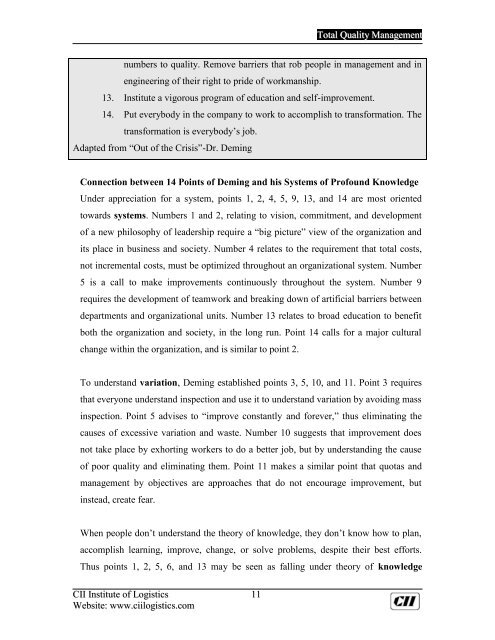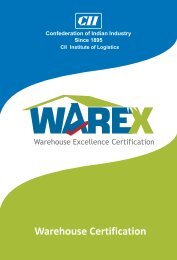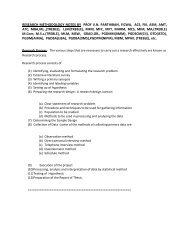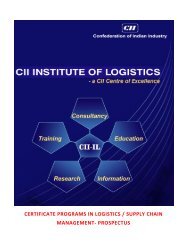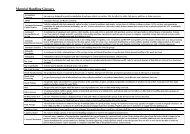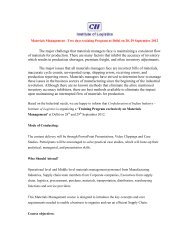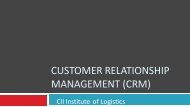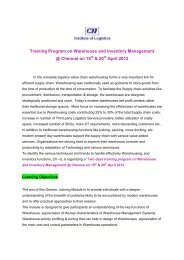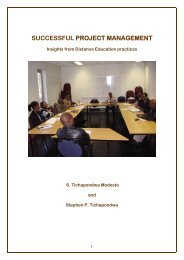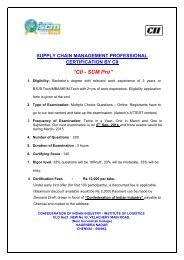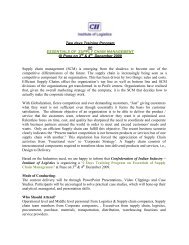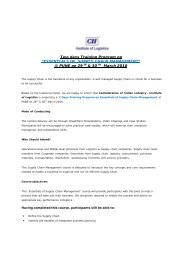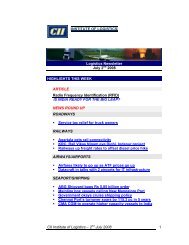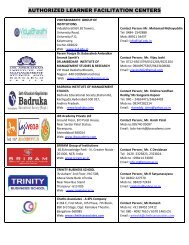Total Quality Management - CII Institute of Logistics
Total Quality Management - CII Institute of Logistics
Total Quality Management - CII Institute of Logistics
Create successful ePaper yourself
Turn your PDF publications into a flip-book with our unique Google optimized e-Paper software.
<strong>Total</strong> <strong>Quality</strong> <strong>Management</strong><br />
numbers to quality. Remove barriers that rob people in management and in<br />
engineering <strong>of</strong> their right to pride <strong>of</strong> workmanship.<br />
13. <strong>Institute</strong> a vigorous program <strong>of</strong> education and self-improvement.<br />
14. Put everybody in the company to work to accomplish to transformation. The<br />
transformation is everybody’s job.<br />
Adapted from “Out <strong>of</strong> the Crisis”-Dr. Deming<br />
Connection between 14 Points <strong>of</strong> Deming and his Systems <strong>of</strong> Pr<strong>of</strong>ound Knowledge<br />
Under appreciation for a system, points 1, 2, 4, 5, 9, 13, and 14 are most oriented<br />
towards systems. Numbers 1 and 2, relating to vision, commitment, and development<br />
<strong>of</strong> a new philosophy <strong>of</strong> leadership require a “big picture” view <strong>of</strong> the organization and<br />
its place in business and society. Number 4 relates to the requirement that total costs,<br />
not incremental costs, must be optimized throughout an organizational system. Number<br />
5 is a call to make improvements continuously throughout the system. Number 9<br />
requires the development <strong>of</strong> teamwork and breaking down <strong>of</strong> artificial barriers between<br />
departments and organizational units. Number 13 relates to broad education to benefit<br />
both the organization and society, in the long run. Point 14 calls for a major cultural<br />
change within the organization, and is similar to point 2.<br />
To understand variation, Deming established points 3, 5, 10, and 11. Point 3 requires<br />
that everyone understand inspection and use it to understand variation by avoiding mass<br />
inspection. Point 5 advises to “improve constantly and forever,” thus eliminating the<br />
causes <strong>of</strong> excessive variation and waste. Number 10 suggests that improvement does<br />
not take place by exhorting workers to do a better job, but by understanding the cause<br />
<strong>of</strong> poor quality and eliminating them. Point 11 makes a similar point that quotas and<br />
management by objectives are approaches that do not encourage improvement, but<br />
instead, create fear.<br />
When people don’t understand the theory <strong>of</strong> knowledge, they don’t know how to plan,<br />
accomplish learning, improve, change, or solve problems, despite their best efforts.<br />
Thus points 1, 2, 5, 6, and 13 may be seen as falling under theory <strong>of</strong> knowledge<br />
<strong>CII</strong> <strong>Institute</strong> <strong>of</strong> <strong>Logistics</strong> 11<br />
Website: www.ciilogistics.com


